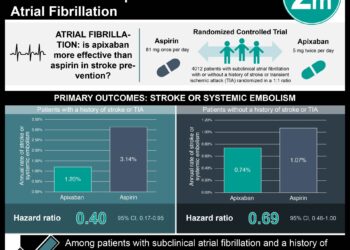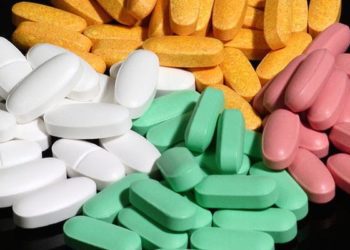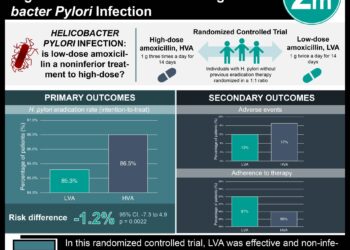Heliobacter pylori eradication significantly reduces the risk of short-term hospitalization in patients taking low dose aspirin
1. In the first 2.5 years after H. pylori eradication, there was a 65% reduction in hospitalizations and deaths due to peptic ulcer bleeding.
2. This reduction was not sustained at subsequent follow-up longer than 2.5 years.
Evidence Rating Level: 1 (Excellent)
Study Rundown: Aspirin is a commonly prescribed anti-platelet medication for patients with coronary artery disease, but it has been associated with a risk of gastrointestinal bleeding. Heliobacter pylori (H pylori) has been shown to potentially play a role in peptic ulcer formation in patients on low dose aspirin. This study aimed to evaluate the effectiveness of H pylori eradication (oral clarithromycin, metronidazole, and lansoprazole twice daily for one week) at preventing hospitalization or death due to probable peptic ulcer bleeding. After two-and-a-half years, H pylori eradication conferred a 65% reduction in hospitalizations and death due to peptic ulcer disease compared to placebo. However, this reduction was not sustained with longer follow-up. The most reported side effect of the eradication treatment was taste disturbance. A limitation of this study includes the low number of primary outcome events, which actual lead to the premature termination of the study as they did not reach the planned number of outcomes. Nonetheless, this large-scale study demonstrated the possible role for H pylori eradication in protecting against aspirin-associated peptic ulcer disease.
Click to read the study in the Lancet
In-Depth [randomized controlled trial]: HEAT (Helicobacter Eradication Aspirin Trial) was a randomized-controlled trial in the UK. Eligible patients were defined as men and women aged 60 years or older on aspirin at a dose of 325 mg or less per day. Participants required an unequivocally positive H pylori C13 urea breath test. Exclusion criteria included taking non-steroidal anti-inflammatory drugs (NSAIDs) or gastroprotective drugs prior to enrolment. A total of 5352 patients were randomly assigned to either active eradication (n=2677) or control group (n=2675). Active eradication was defined as a combination of oral clarithromycin 500 mg, metronidazole 400 mg, and lansoprazole 30 mg taken twice daily for 1 week. Median follow-up was 5.0 years. Hospitalization or death due to probable peptic ulcer bleeding was the primary outcome. After 2.5 years, the incidence of the primary outcome was significant reduced with eradication (hazard ratio 0.35 [95% CI 0.14-0.89]; p=0.028). This reduction was not seen with follow-up after the first 2.5 years (HR 1.31 [0.55-3.11]). The most common adverse event was taste disturbance. Overall, findings suggest that primary prevention with H pylori eradication may not have a long-term benefit for prevention of peptic ulcer disease-related bleeding events.
Image: PD
©2022 2 Minute Medicine, Inc. All rights reserved. No works may be reproduced without expressed written consent from 2 Minute Medicine, Inc. Inquire about licensing here. No article should be construed as medical advice and is not intended as such by the authors or by 2 Minute Medicine, Inc.







